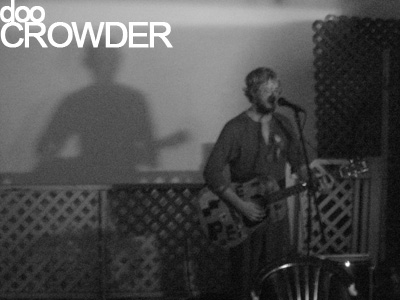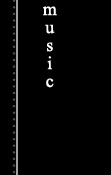




“Nothing great was ever achieved in comfort,” my good friend Ingvald Johnson once said in an interview. This quote I have taken with me for the last decade and while I oftentimes understand what he meant – I have come to learn that I don’t always understand how discomfort really feels; how it really plays-out in a situation. Enter: Doo Crowder. At a benefit show three years ago, Doo Crowder took the stage. Ten minutes later and I was in such distress I had to leave the room. Doo started songs, stopped, then started new songs. He played from a notebook – songs that he may have written on the drive to the show. I have never forgotten the kind of discomfort that I experienced in that room. And only recently have I begun to understand what that meant – that emotion, for me; and, for Doo Crowder. I suppose that I wished to learn about the history of Doo Crowder, if that is his name at all. I wanted to know why he called his last band, Pee Pee. I wanted to know why he has that spelled-out in-tape, on his guitar. I wanted the particulars, the history – the concrete reasons, the anecdotes. Afterall, if you have seen the many faces of Crowder around town, as Pee Pee, as himself, all relative to his new incarnation – a heartbreaking and beautiful one-man show – you too may wonder where this man who dons a sheet over his head on-stage, came from. Then again, maybe we shouldn’t want to know. For as Crowder said, that would enable people to cast him aside – as having felt like they really knew him. Really knew how to define him. People may begin to believe which bank to shove him into, in their cognitive catalogue. And to do this would also to diminish the mystery, the magical act of what Crowder has created. So, instead of particulars, where Crowder and I began our conversation was on the level of abstracts. Of ideas. Theories. Perceptions. In the end, I learned that, to begin to know Doo Crowder as a man, one must come to understand his music and his performances on stage. It is a certain and true fact that our cognitive faculties crave cataloging. Polarities. Dichotomies. Zeroes and ones. Black and white. Positive and negative. In this, the drive to swim in a world where everything is a fluid wash of land under prismatic skies and amalgamated clouds full of stormy ideas is a scary premise. A discomforting ideal. To begin to understand Doo Crowder’s musical endeavors, it may be best to understand Crowder’s notion of the stage as bizarre. For Crowder, the stage and the idea of performance in a public setting is a strange concept – as the stage is that place where so much can happen and where the license for provocation is granted but really, the stage can also be an underutilized place that most often, isn’t fully utilized by its performers. For Crowder, the importance of performing live begins with the notion of meeting both the music and the performance where it asks to be met. For Crowder, this is true for himself, on that stage, and the audience before him. Enter: Discomfort. Doo Crowder’s music, his preparation, the lessons he has learned from the many years of performing in public serve as his lexicon. His dictionary. His color palatte. The stage is his blank page. His canvas. That thing which, every time he reverently steps onto it he seeks to paint with the language that he feels is most appropriate for the moment. His performances are not boring. Any time that Doo Crowder takes the stage, you can’t be certain as to what, exactly, is going to happen. And rest assured, his motives are not pretentious. Nor are they easily digestible. In fact, I would dare to say that Crowder’s performances are not entirely about him. A half-reflection of he and the music and the performance, Crowder’s sets are also half-reflections of the audience before him. He sets-up his performances with an aim of creating an acceptable context from which he can launch from. And then, it’s about pushing the boundaries around him and even, elevating some kind of sense of discomfort. For himself and especially for the audience. For Crowder, music is participatory. It’s not all about the performer. To articulate this concept, he will oftentimes reach-out and begin in a simple place with the audience like, asking them to snap their fingers and overcome their historical inertia. Just as it has been for my friend Ingvald, so too is it true for Doo Crowder: what makes you comfortable, makes you weaker. In all his musical movements, Crowder abhors the idea of being busy dying. Instead, he aims for the virtuous light of trying to remain being born, over and over again. Some of Crowders lyrics are childish. Some elements of his performances mirror this. I would even posit that a band with a name of Pee Pee mirrors this idea. Of the arcane. Of the obtuse. Of the indefinable. Sometimes, he even makes up sounds instead of words, evoking the play on all elements of communication; creating a vignette of a man that is alive creating the sounds of his life, his sense of vibrancy. Certainly, this is not a simple premise to work from, as an artist; a performer: To constantly be born instead of being preoccupied with dying. And being stagnant. And comfortable. And having your act polished. Certainly, there are many skill sets that are needed in order to work from this complicated, airy place where anything could, and does, happen. Whatever those skill sets are: fearlessness, strength, malleability, wit – Crowder seems to possess them without pomp or pretension. If you have not witness Crowder’s new solo incarnation, check his website for upcoming dates. If you crave to be moved from a performance and for the bravery of an act, pay attention: www.myspace.com/doocrowder |









